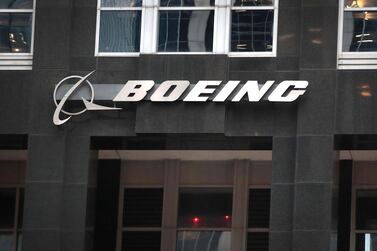Boeing raised $25 billion (Dh91.8bn) on Thursday in the largest US corporate bond offering of the year, helping the company avoid immediate state aid as the Covid-19 pandemic hits the global aviation industry.
Demand for the offering was "robust" and reflects long-term support for the company and the aviation industry, the Chicago-based aerospace company said.
"As a result of the response ... we do not plan to seek additional funding through the capital markets or the US government options at this time," Boeing said.
"We will continue to assess our liquidity position as the health crisis and our dynamic business environment evolve."
The bond sale came after the aerospace company reported its second consecutive quarterly loss and burnt through cash at record rates while the pandemic brought global air travel to a near-standstill.
Plane makers, aircraft lessors, airlines and suppliers are facing an unprecedented crisis. Passenger demand has plunged to near zero, more than half of the world's fleet is grounded and the global economy faces its deepest recession since the Great Depression of the 1930s.
Boeing's bond offering, coming just weeks after it considered seeking state aid, includes seven tranches with maturities ranging from three to 40 years.
The capital raise is the sixth-largest investment-grade bond offering of all time and the biggest this year, according to Refinitiv data.
The bond sale allowed Boeing to forgo federal aid that would have come with restrictions and strings attached, including the possibility of the US government taking a stake in the company.
The US Federal Reserve's measures to support credit markets during the pandemic, combined with the Trump administration's backing for the company, were among the reasons for the success of Boeing's bond sale, analysts said.
The strong demand for Boeing's bond offering is "in part a result of the confidence in the market created by the [Coronavirus Aid, Relief and Economic Security] Act and federal support programmes that have been put in place – a testament to the administration, Congress and the Federal Reserve," Boeing said.
On April 29, S&P Global cut Boeing's credit rating to one level above junk with a stable outlook. The agency downgraded its rating to ‘BBB-/A-3’ from ‘BBB/A-2’, on expectations of a decline in cash flow as Boeing faces fewer aircraft deliveries and aftermarket sales due to the impact of the coronavirus on air travel.
Boeing included a provision in its bond sale that pledges to increase the interest rate for each downgrade into junk territory, according to Bloomberg.
The aircraft maker, which released its financial results on April 29, said its first-quarter loss was driven by the impact of the Covid-19 crisis and the grounding of the 737 Max.
The company plans to reduce its workforce and cut its monthly 787 Dreamliner production rate from 14 to 10 in 2020, and gradually reduce the figure to seven by 2022.
The 777 and 777X combined production rate will be reduced to three per month in 2021.
Boeing held $15.5bn in cash and investments in marketable securities by the end of the first quarter.
The cash, along with funds raised from its bond sale, means Boeing has $40.5bn in resources to cope with the aftermath of the pandemic over the next few years.
The transaction is expected to close on May 4.







